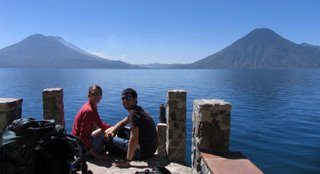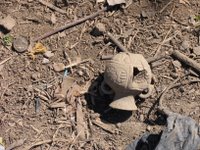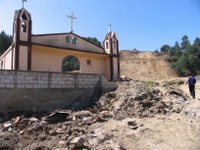
the view from our hotel room

waiting at the dock for a boat-taxi
Panajachel is also known as “Gringotenango” because of the influx of ex-pats and trinket-buying tourists. The pasty Americans and Germans create startling silhouettes against the rich Prussian blue of Lago Atitlán. We came here on vacation for the week, but our first day has been revealing. All I can think about is work, la JEM, and art.
In search of a romantic B&B for Valentine’s Day, we stumbled upon an art gallery instead. An art gallery! My excitement waned after meeting the stuffy, stuck-up, and rude German owners. They say they run the oldest gallery in Central America—35 years old—and were too busy setting up an erotic exhibit for V-day to answer questions or ask why I was around. They had an extensive collection of work from foreign and Guatemalan artists and bragged about once having a Picasso and a Max Beckman. On display were works made in the style of VitroMache, especially stained-glass lamps, mirrors, and sculptures, some made from discarded bottles, all put together with a mixture of glue, paper-mache, and cement. I was intrigued by the technique, thinking it would be excellent for a large sculpture/memorial I am thinking about for one of the communities in which I am working, and I asked where I could learn more. They sent me to the studio of Patric, where VitroMache began, just a few doors away.
A Mexican hippie, Patric came to Guatemala five years ago as a volunteer, teaching people how to make art out of garbage. After going broke and becoming disillusioned he started charging for his workshops. It was only then that he began to see results. Working against what he calls “the paternalism” of the U.S., Patric thinks charging hefty sums for his workshops is the only way that Guatemalans will be serious about working. Then, he reasons, they will have skills which they can use to pull them out of poverty, without having to rely on the foreigner. He implies economic freedom is the only true freedom. Patric refused to teach me if I didn’t then turn around and charge others for the same knowledge. He was appalled at how little my students are paying and was convinced that they had the money to pay but were looking for a handout. He thinks volunteerism is a gigantic farce because it perpetuates the expectation that someone else will do the work for you.
Our friend, Doug, who recently finished two years of Peace Corps service in the mountains of Peru, referenced this in regards to his village when he explained to us that the native people would tell the different NGOs exactly what they wanted to hear so that they could benefit from more programs and funding. Also, a professor from Williams, Peggy Diggs, urged me to do ArtCorps but also questioned whether the program was merely promoting Western values (environmentalism, children’s rights, etc.) in the face of traditional values and cultural mores, possibly leaving the communities forever changed in the long-run.
I don’t know. La JEM decided long before I arrived to focus on the environment in order to save their land and their future; a foreign NGO didn’t tell them that was important. That said, my mere presence here in Guatemala does promote Western values. I am unable to say that I am from a brother country like Colombia or Nicaragua; I cannot improve the relationships among Latin American countries and teach the children in the market about my country, because they already know, or think they know. Every once in a while, when I explain that I once lived in Venezuela, some children look at me and ask, “What is Venezuela?” I am from the country that is the envy of all, the place most everyone wants to go, and my presence, my culture, my clothes, and my beliefs—including the way I think about, make, and teach art—it is all very Western.
Patric questions the foundation of why I am here in Guatemala. I imagine my participants from the first week of workshops and ponder whether they are serious, whether they will continue, whether I am perpetuating the paternalism of the U.S. On the other hand, I resent the stereotype and the idea that as an American I can only further damage this place. And yet again, I do not know exactly what I think I’m doing here. It’s insulting that Patric immediately assumed I can’t help, and that he, as a Latin American, has the ability to so easily crush my optimism, but it’s worse that I have lost confidence in my myself, in my mission.
Gringotenango isn’t a real place, though. It’s where the tables fill at sunset to watch the lake disappear into the darkness, where foreigners sip overpriced beers, where the streets are always full of indigenous women and children trying to hawk artesanía in broken English, where there are health food stores that sell bagels, hummus, and sushi. This place is not real—it’s easy. It’s easy to live off the foreigners and hang out with hippies that have the same relativist ideas. It’s a small touristy island in the middle of a country wrought with poverty, struggle, and no, I don’t know what else.
I do know that San Pablo isn’t disillusioned and that the jóvenes aren’t expecting me to fix all of their problems. I may have some students that think I can teach them how to paint in three weeks, but I know the base of la JEM knows how little an imprint I can and will make. Don Feliciano, our gracious host father and the founder of the progressive school in San Pablo from which la JEM was born, is very wise. I saw this as he introduced us to his village in church the first Sunday after our arrival; minutes before calling us up to the microphone, he made the point of saying that
Sólo el pueblo puede levantarse. Only the people can lift themselves up.





